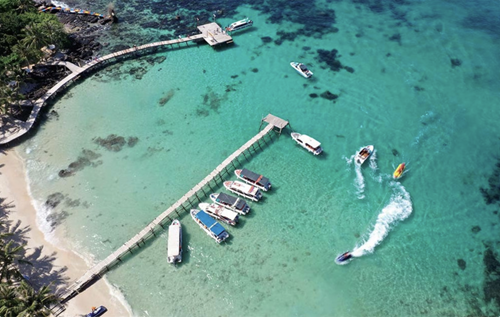Cornerstone of tourism recovery
Vietnam's visa policy has made remarkable strides in recent years, with one of the most significant milestones being the approval of the law on amending and supplementing several articles to the Law on entry, exit, transit and residence of foreigners in Vietnam that took effect on August 15, 2023. Under this legislation, electronic visas (e-visas) now allow stays of up to 90 days, available for single or multiple entries, and apply to citizens of all countries and territories worldwide. This represents an unprecedented development in Vietnam's visa policy history.
    |
 |
|
Phu Quoc island is a favorite destination of both domestic and international visitors. (Photo: baodautu.vn) |
Deputy Director of the Vietnam National Authority of Tourism Pham Van Thuy affirmed that the visa policy is one of the most critical tools in destination competitiveness, especially as countries are intensifying efforts to attract international tourists in the post-COVID era.
Vietnam’s e-visa system is now seen as one of the most efficient, convenient, and transparent in the region. Fully online registration, no paperwork or interviews, and fast and flexible processing time have improved foreigners’ entry experience, creating a competitive advantage over countries clinging to complicated and costly visa procedures.
Tourism visas serve not merely as administrative tools, but as a key that opens pathways for cultural exchange, investment growth, economic connectivity, and sustainable foreign currency revenue generation.
Additionally, bilateral visa exemptions are being put in place for 15 countries with stay periods ranging from 14 to 90 days, and unilateral visa exemptions for 12 developed nations including the UK, France, Germany, Italy, Spain, Nordic countries, Japan, the Republic of Korea, and Russia until March 14, 2028, with stays of up to 45 days.
Earlier this year, the Government issued a resolution on piloting conditional short-term visa exemptions for citizens of Poland, the Czech Republic, and Switzerland from March 1 to December 31, 2025. This forward-thinking move not only opens potential European markets but also directly links with tourism stimulus programs, enabling Vietnamese travel firms to be more proactive in organizing high-quality inbound tours. This model is expected to expand to other markets soon.
Closing gaps with regional competitors
Despite significant progress, Vietnam still lags behind regional countries. Currently, Malaysia offers visa-free access to citizens of 166 countries, Indonesia to 169, Singapore to 158, the Philippines to 157, and Thailand to 93.
Some countries also offer group visas at entry points, visas on arrival, or special exemptions for MICE (Meetings, Incentives, Conferences, and Exhibitions) travelers and air or sea transit passengers. Against the backdrop, Vietnam must accelerate reforms or risk losing ground in the global tourism race.
Visa policy only proves effective when it is integrated with well-organized promotion and marketing ecosystems. Recognizing this, Vietnam's tourism industry is advancing a national brand positioning strategy called "Vietnam - Timeless Charm" and new initiatives like green experiences, profound culture, unique cuisine, and friendly people.
The Ministry of Culture, Sports and Tourism proposed establishing Vietnam tourism promotion offices in strategic markets. Simultaneously, it is developing a national digital tourism promotion ecosystem incorporating AI and big data while boosting tourism images through such digital platforms as Google, Facebook, and TikTok.
Additionally, the 2025 tourism stimulus program will include a harmonious communications campaign at home and abroad under the message of “Vietnam – Travel to Love” message," said Thuy.
Along with traditional markets like Japan, the Republic of Korea, and China, Vietnam is targeting emerging destinations like India, the Middle East, and South America, which boast a fast-growing middle class, rising demand for overseas travel, and higher average spending.
According to insiders, simplifying entry procedures, expanding visa exemptions, and diversifying visa types are seen as “institutional vaccines” that will create a more attractive environment, creating a domino effect on related industries such as aviation, hospitality, retail, gastronomy, and culture.
While Vietnam has made promising steps, it should increase the number of visa-exempt countries, reduce visa fees, expand group visas, and link visa policy more closely with trade, investment, and education promotion.
In the long run, it is essential to create a coordination mechanism among the State, businesses, and diplomatic agencies to establish an innovative visa policy, insiders said.
Source: VNA